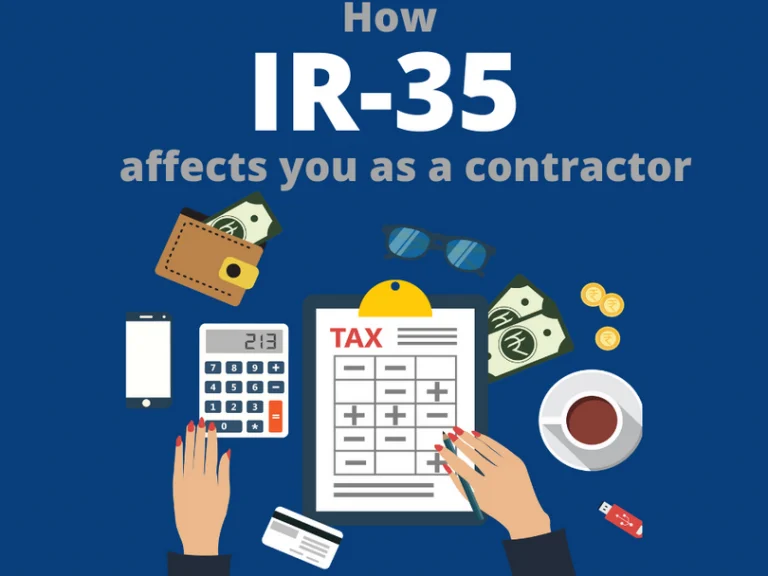Definitions (for the purpose of this article):
Contractor: the individual who is granted work by the employer and operates either as self employed, through their own limited company or through an agency (in which case, the onus would be on the agency to determine employment status).
Company: the organisation who is acting as the employer and paying for services / expertise from the contractor.
What is IR35?
IR35 is a set of rules that applies to workers who provide their work through an intermediary party. The rules would apply to anyone who is contracting either under an umbrella company (agency) or through their own limited companies.
The rules were essentially introduced in the year 2000 as a mechanism to combat tax avoidance. They are there to ensure that an individual contractor pays the equivalent tax and national insurance contributions as they would do if they were an actual employee, working for the company on their payroll and covering the same position / responsibilities.
As we will discover though, at present, this is very rarely happening.
How do current contractors escape high tax payments?
The way contractors have traditionally set themselves up is to incorporate their own limited company where they are the sole employee. They pay themselves the minimum wage but come the end of the tax year, they take a big dividend payment which consequently incurs much lower tax implications. This is versus receiving the payments monthly and paying normallevels of income tax and National Insurance Contributions (NIC). The latest figures from HMRCshowed that due to this loophole, an extremely low 10% of contractors complied with the current IR35 rules leading to a very urgent calls for reform.

What is the current state of the Construction Industry?
In the construction industry, the use of contractors is extremely common due to the fragmented nature of projects and the finite duration of many contracts, for example, a 12-month project to build a new car park or an 18-month contract for a housing development. Once the work is complete, the contractor’s specialist expertise is no longer required, making this a cost-effective way for companies to control staff overheads and adapt to changing workloads.
For contractors, this arrangement often means a significantly higher rate of pay than a permanent position, in exchange for forgoing the usual employment benefits. Additional advantages include greater flexibility to manage their work–life balance and the freedom to work only when they choose to.
Benefits for companies include the ability to:
- Adjust staffing costs in line with current project demands
- Easily scale down labour costs without lengthy notice periods
- Save money on holiday pay, sick pay, PAYE, National Insurance, company vehicles, health care, pay rises, and pensions
- Access specialised expertise without needing to hire permanent staff
These mutual benefits have driven steady growth in the number of contractors and the companies that engage them, helping to maintain a healthy balance of supply and demand within the construction sector.
What are the changes?
Previously, it was the responsibility of the contractor’s limited company to determine their own employment status for each assignment. Under the new rules, this responsibility now shifts to the hiring company. If a company engages a contractor but fails to correctly declare their true rate of pay, for example, if the contractor draws a minimal salary and large dividends instead of paying standard income tax and National Insurance, the company can face substantial fines for breaching statutory obligations.
In practice, this means companies must assess and determine whether a contractor should be classed as a genuine self-employed worker or, in reality, treated as a permanent employee. If a contractor is found to be working under conditions equivalent to direct employment, the company will be liable for all associated taxes and contributions, just as they would be for a regular employee on payroll.
However, defining employment status remains a complex and often grey area, with many legal disputes showing mixed outcomes for both contractors and companies. A useful starting point is to examine whether a business-to-business arrangement is genuinely in place, for example, whether payments cover only the individual’s wages or also include other legitimate business expenses and activities.

When will the new rules be introduced and enforceable?
The new rules have been enforceable in the public sector (publicly funded organisations) since 6th April 2017.
The new rules were then supposed to be extended to the private sector with and its Medium /Large companies in April 2020 but due to the Covid-19 outbreak the Government has pushed the date of introduction back to 6th April 2021.
It is important to note that the new rules will not affect small companies. The criteria that a company will be assessed on to determine whether they fit into the ‘medium or large’ categories are if the company in question satisfies 2 or more of the below:
- A turnover of more than £10.2million
- A balance sheet total of more than £5.1million
- 49 employees or more
If they do not, they will be broadly determined to be a ‘small’ company.
What affect is this likely to have on the construction industry?
The potential impact on the construction industry is significant. According to ONS figures, up to 50% of workers in the sector provide their services as contractors. This highlights just how many individuals and the companies that engage them, could be affected by the new legislation and the added responsibility of correctly determining employment status. Below is a brief list of common roles and professions in construction that are frequently engaged on a contract basis:
- Quantity Surveyors
- Project Managers
- Architects
- Design expertise
- Site Agents

It is certainly important to realise that the reform to IR35 makes the legislation more intrusive and will affect the way construction expertise is paid for, with suchlarge fines hanging over any misconduct and the sheer number of professional contractors working in such a way.
Additionally, HMRC reserves the right to investigate any employment case for up to 6 years after the event.
However, ask yourself the following questions if working in this way is something you want to continue or start to do as a contractor or whether you are the company employing them.
Companies:
- Firstly, determine whether your company falls into the ‘small’ or ‘medium and large’ brackets. If you fall into the small bracket and you employ contractors, you do not need to do anything.
- Acknowledge that there will still be individuals who will pursue temporary employment rather than seeking a permanent position on your payroll.
- Offer an increased number of temporary employment contracts for required roles. This way you will not have the commitment of adding someone to your payroll permanently and will still have a fairly high level of flexibility when controlling your staff overheads based on company workload.
- The contractor could work for you as ‘self-employed’ rather than through their limited company and then it may be possible to keep the same rate of pay. However, it could be argued by the HMRC that this is one of permanent employment so the terms must be watertight.
Contractors:
- Does the company you work for supply you with IT and other equipment such as a laptop, printer, and phone?
- Do you work a full-time, 37.5 hours week? And for one company and one company alone?
- Does the work you carry out for that company include a vast array of tasks depending on what their daily or weekly requirements are and/or wants? Or in other words, are the specific tasks that they are employing you for not very clearly defined?
- Do you work for medium or large company and sit with the other full-time employees intheir office and part of their team?
If an individual answered yes to all or some of the above, then under the IR35 rules it is very likely that they could be deemed a permanent employee. And that the individual, and the company they are carrying out work for, would be liable to normal tax contributions If an individual answered no to the questions, then it is likely that they will not fall into the new IR35 rules and are not able to be deemed a permanent employee. Although as mentioned before IR35 is notoriously grey so even if you answered no to all the questions, you may still be deemed as a permanent employee.
Disclaimer, We are not providing legal advice in this area. Please seek professional legal advice for more information.
Why not watch our videos on IR35?










